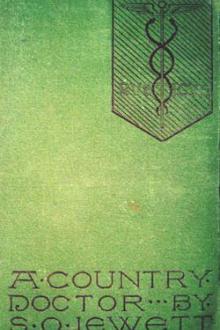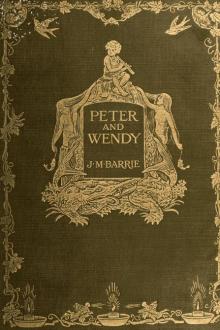A Country Doctor by Sarah Orne Jewett (top novels TXT) 📕

- Author: Sarah Orne Jewett
- Performer: -
Book online «A Country Doctor by Sarah Orne Jewett (top novels TXT) 📕». Author Sarah Orne Jewett
Sometimes she felt herself carried along upon a rushing tide, and was amazed that a hundred gifts and conditions to which she had scarcely given a thought seemed dear and necessary. Once she fancied herself in a quiet home; living there, perhaps, in that very house, and being pleased with her ordering and care-taking. And her great profession was all like a fading dream; it seemed now no matter whether she had ever loved the studies of it, or been glad to think that she had it in her power to make suffering less, or prevent it altogether. Her old ambitions were torn away from her one by one, and in their place came the hardly-desired satisfactions of love and marriage, and home-making and housekeeping, the dear, womanly, sheltered fashions of life, toward which she had been thankful to see her friends go hand in hand, making themselves a complete happiness which nothing else could match. But as the night waned, the certainty of her duty grew clearer and clearer. She had long ago made up her mind that she must not marry. She might be happy, it was true, and make other people so, but her duty was not this, and a certainty that satisfaction and the blessing of God would not follow her into these reverenced and honored limits came to her distinctly. One by one the reasons for keeping on her chosen course grew more unanswerable than ever. She had not thought she should be called to resist this temptation, but since it had come she was glad she was strong enough to meet it. It would be no real love for another person, and no justice to herself, to give up her work, even though holding it fast would bring weariness and pain and reproach, and the loss of many things that other women held dearest and best.
In the morning Nan smiled when her aunt noticed her tired look, and said that the play had been a pursuit of pleasure under difficulties. And though Miss Prince looked up in dismay, and was full of objections and almost querulous reproaches because Nan said she must end her visit within a day or two, she hoped that George Gerry would be, after all, a reason for the girl's staying. Until Nan, who had been standing by the window, looking wistfully at the garden, suddenly turned and said, gently and solemnly, "Listen, Aunt Nancy! I must be about my business; you do not know what it means to me, or what I hope to make it mean to other people." And then Miss Prince knew once for all, that it was useless to hope or to plan any longer. But she would not let herself be vanquished so easily, and summoned to her mind many assurances that girls would not be too easily won, and after a short season of disapproving silence, returned to her usual manner as if there had been neither difference nor dispute.
XX ASHORE AND AFLOAT"Your cousin Walter Parish is coming to dine with us to-day," said Miss Prince, later that morning. "He came to the Fraleys just after you went out last evening, to speak with me about a business matter, and waited to walk home with me afterward. I have been meaning to invite him here with his wife, but there doesn't seem to be much prospect of her leaving her room for some time yet, and this morning I happened to find an uncommonly good pair of young ducks. Old Mr. Brown has kept my liking for them in mind for a great many years. Your grandfather used to say that there was nothing like a duckling to his taste; he used to eat them in England, but people in this country let them get too old. He was willing to pay a great price for ducklings always; but even Mr. Brown seems to think it is a great wrong not to let them grow until Thanksgiving time, and makes a great many apologies every year. It is from his farm that we always get the best lamb too; they are very nice people, the Browns, but the poor old man seems very feeble this summer. Some day I should really like to take a drive out into the country to see them, you know so well how to manage a horse. You can spare a day or two to give time for that, can't you?"
Nan was sorry to hear the pleading tone, it was so unlike her aunt's usually severe manner, and answered quickly that she should be very glad to make the little excursion. Mr. Brown had asked her to come to the farm one day near the beginning of her visit.
"You must say this is home, if you can," said Miss Prince, who was a good deal excited and shaken that morning, "and not think of yourself as a visitor any more. There are a great many things I hope you can understand, even if I have left them unsaid. It has really seemed more like home since you have been here, and less like a lodging. I wonder how I—When did you see Mr. Brown? I did not know you had ever spoken to him."
"It was some time ago," the girl answered. "I was in the kitchen, and he came to the door. He seemed very glad to see me," and Nan hesitated a moment. "He said I was like my father."
"Yes, indeed," responded Miss Prince, drearily; and the thought seized her that it was very strange that the same mistaken persistency should show itself in father and child in exactly opposite ways. If Nan would only care as much for marrying George Gerry, as her father had for marrying his wretched wife! It seemed more and more impossible that this little lady should be the daughter of such a woman; how dismayed the girl would be if she could be shown her mother's nature as Miss Prince remembered it. Alas! this was already a sorrow which no vision of the reality could deepen, and the frank words of the Oldfields country people about the bad Thachers had not been spoken fruitlessly in the ears of their last descendant.
"I am so glad the captain is coming," Nan said presently, to break the painful silence. "I do hope that he and Dr. Leslie will know each other some time, they would be such capital friends. The doctor sent his kind regards to you in last night's letter, and asked me again to say that he hoped that you would come to us before the summer is over. I should like so much to have you know what Oldfields is like." It was hard to save herself from saying "home" again, instead of Oldfields, but the change of words was made quickly.
"He is very courteous and hospitable, but I never pay visits nowadays," said Miss Prince, and thought almost angrily that there was no necessity for her making a target of herself for all those curious country-people's eyes. And then they rose and separated for a time, each being burdened less by care than thought.
The captain came early to dine, and brought with him his own and Miss Prince's letters from the post-office, together with the morning paper, which he proceeded to read. He also seemed to have a weight upon his mind, but by the time they were at table a mild cheerfulness made itself felt, and Nan summoned all her resources and was gayer and brighter than usual. Miss Prince had gone down town early in the day, and her niece was perfectly sure that there had been a consultation with Mr. Gerry. He had passed the house while Nan sat at her upper window writing, and had looked somewhat wistfully at the door as if he had half a mind to enter it. He was like a great magnet: it seemed impossible to resist looking after him, and indeed his ghost-like presence would not forsake her mind, but seemed urging her toward his visible self. The thought of him was so powerful that the sight of the young man was less strange and compelling, and it was almost a relief to have seen his familiar appearance,—the strong figure in its every-day clothes, his unstudent-like vigor, and easy step as he went by. She liked him still, but she hated love, it was making her so miserable,—even when later she told Captain Parish some delightful Oldfields stories, of so humorous a kind that he laughed long and struck the table more than once, which set the glasses jingling, and gave a splendid approval to the time-honored fun. The ducklings were amazingly good; and when Captain Walter had tasted his wine and read the silver label on the decanter, which as usual gave no evidence of the rank and dignity of the contents, his eyes sparkled with satisfaction, and he turned to his cousin's daughter with impressive gravity.
"You may never have tasted such wine as that," he said. "Your grandfather, the luckiest captain who ever sailed out of Dunport, brought it home fifty years ago, and it was well ripened then. I didn't know there was a bottle of it left, Nancy," he laughed. "My dear, your aunt has undertaken to pay one of us a handsome compliment."
"Your health, cousin Walter!" said the girl quickly, lifting her own glass, and making him a little bow over the old Madeira.
"Bless your dear heart!" responded the captain; "the same good wishes to you in return, and now you must join me in my respects to your aunt. Nancy! I beg you not to waste this in pudding-sauces; that's the way with you ladies."
The toast-drinking had a good effect upon the little company, and it seemed as if the cloud which had hung over it at first had been blown away. When there was no longer any excuse for lingering at the table, the guest seemed again a little ill at ease, and after a glance at his hostess, proposed to Nan that they should take a look at the garden. The old sailor had become in his later years a devoted tiller of the soil, and pleaded a desire to see some late roses which were just now in bloom. So he and Nan went down the walk together, and he fidgeted and hurried about for a few minutes before he could make up his mind to begin a speech which was weighing heavily on his conscience.
Nan was sure that something unusual was perplexing him, and answered his unnecessary questions patiently, wondering what he was trying to say.
"Dear me!" he grumbled at last, "I shall have to steer a straight course. The truth is, Nancy has been telling me that I ought to advise with you, and see that you understand what you are about with young Gerry. She has set her heart on your fancying him. I dare say you know she has treated him like a son all through his growing up; but now that you have come to your rightful place, she can't bear





Comments (0)